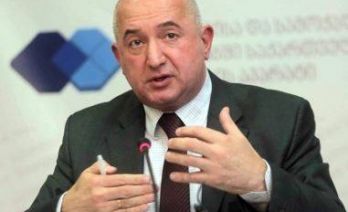- Public Information
- STRATEGIC DOCUMENTS
- NOTIFICATION FOR THE IMPLEMENTATION OF EMERGENCY HUMANITARIAN ASSISTANCE IN OCCUPIED TERRITORIES
- NOTIFICATION FOR INTERGOVERNMENTAL/DEVELOPMENT ORGANIZATIONS OPERATING IN OCCUPIED TERRITORIES
- NOTIFICATION FOR THE IMPLEMENTATION OF NON-EXEMPT ACTIVITIES IN OCCUPIED TERRITORIES OF GEORGIA
- NOTIFICATION ON ENTERING THE OCCUPIED TERRITORIES
- GENEVA INTERNATIONAL DISCUSSIONS
- INCIDENT PREVENTION AND RESPONSE MECHANISM (IPRM)
Mr. Paata Zakareishvili: Media Covered the Statement Made at the Committee Hearing only Partially
6 November 2015
 According to the State Minister for Reconciliation and Civic Equality Mr. Paata Zakareishvili, the statement on the restriction of movement for the residents of Abkhazia and South Ossetia with Russian passports, made at the committee hearing, was covered by media only partially. This was declared by Mr. Zakareishvili to “Interpressnews” Agency on the following question: “during your speech at the committee hearing at the Parliament, you have spoken about the restriction of movement for the residents of Abkhazia and South Ossetia with Russian passports. You noted that this was the part of non-recognition policy, but does the non-recognition policy restrict the humanitarian rights?”
According to the State Minister for Reconciliation and Civic Equality Mr. Paata Zakareishvili, the statement on the restriction of movement for the residents of Abkhazia and South Ossetia with Russian passports, made at the committee hearing, was covered by media only partially. This was declared by Mr. Zakareishvili to “Interpressnews” Agency on the following question: “during your speech at the committee hearing at the Parliament, you have spoken about the restriction of movement for the residents of Abkhazia and South Ossetia with Russian passports. You noted that this was the part of non-recognition policy, but does the non-recognition policy restrict the humanitarian rights?” “The reference on Russian passports was made hitherto in Tagliavini Report, which indicated that illegal distribution of passports was managed from the territory of Russian Federation before 2008. After the subsequent occupation and recognition, distribution of these illegal documents proceeded within the occupied territories as well. I spoke about illegal passports into my speech at the Parliament, but unfortunately media covered only the part of this topic, in which I noted that Abkhazians cannot travel with illegal Russian passports that are distributed on the territory of Abkhazia, which remains a part and outcome of non-recognition policy. However, press reports neglected the second position of my speech, in which I noted that we try to find solution together with our partners – travel opportunities with these passports are available in various forms as far as the issues of healthcare, education and other humanitarian needs are concerned. The goal is to prevent any humanitarian obstacles for the people in occupied territory that may possibly derive from non-recognition. In parallel with non-recognition, we want the engagement component to be functional as well. This is one of the clear examples how the European policy for non-recognition and engagement is actually fulfilled,” - Mr. Zakareishvili declared.









